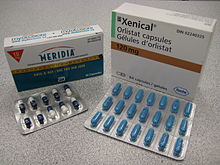
Back أدوية تخسيس Arabic ادويه التخسيس ARZ Antiadipositum German داروی لاغری Persian Pengobatan antikegemukan ID Dimagrante Italian Medicação contra obesidade Portuguese Medicamente antiobezitate Romanian Препараты для лечения ожирения Russian Lekovi protiv gojaznosti Serbo-Croatian
| Part of a series on |
| Human body weight |
|---|

Anti-obesity medication or weight loss medications are pharmacological agents that reduce or control excess body fat. These medications alter one of the fundamental processes of the human body, weight regulation, by: reducing appetite and consequently energy intake, increasing energy expenditure, redirecting nutrients from adipose to lean tissue, or interfering with the absorption of calories.[1][2][3]
Weight loss drugs have been developed since the early twentieth century, and many have been banned or withdrawn from the market due to adverse effects, including deaths; other drugs proved ineffective. Although many earlier drugs were stimulants such as amphetamines, in the early 2020s, GLP-1 receptor agonists became popular for weight loss.
The medications liraglutide,[4] naltrexone/bupropion,[5] orlistat,[6] semaglutide,[7] and tirzepatide[8] are approved by the US Food and Drug Administration (FDA) for weight management in combination with reduced-calorie diet and increased physical activity. As of 2022, no medication has been shown to be as effective at long-term weight reduction as bariatric surgery.[9] The main treatment modalities for obesity remain dieting (healthy diet and caloric restriction) and physical exercise.[citation needed]
- ^ Ryan DH (September 2021). "Next Generation Antiobesity Medications: Setmelanotide, Semaglutide, Tirzepatide and Bimagrumab: What do They Mean for Clinical Practice?". Journal of Obesity & Metabolic Syndrome. 30 (3): 196–208. doi:10.7570/jomes21033. ISSN 2508-6235. PMC 8526285. PMID 34518444.
- ^ Jimenez-Munoz CM, López M, Albericio F, Makowski K (May 2021). "Targeting Energy Expenditure—Drugs for Obesity Treatment". Pharmaceuticals. 14 (5): 435. doi:10.3390/ph14050435. ISSN 1424-8247. PMC 8148206. PMID 34066399.
- ^ National Institute for Health and Clinical Excellence. Clinical guideline 43: Obesity: The prevention, identification, assessment and management of overweight and obesity in adults and children. London, 2006.
- ^ "Saxenda- liraglutide injection, solution". DailyMed.
- ^ "Contrave extended release- naltrexone hydrochloride and bupropion hydrochloride tablet, extended release". DailyMed.
- ^ "Xenical- orlistat capsule". DailyMed.
- ^ "Wegovy- semaglutide injection, solution". DailyMed.
- ^ "Zepbound- tirzepatide injection, solution". DailyMed.
- ^ Cite error: The named reference
pmid34815532was invoked but never defined (see the help page).
© MMXXIII Rich X Search. We shall prevail. All rights reserved. Rich X Search